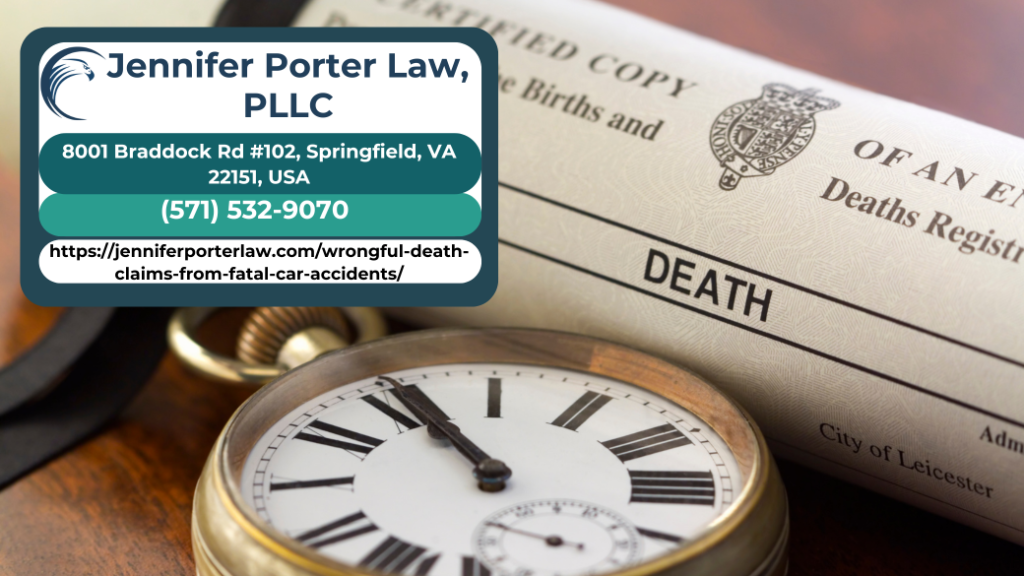Losing a loved one in a fatal car accident is an unimaginable tragedy that can leave families devastated, both emotionally and financially. While no amount of money can replace the loss of a cherished family member, pursuing a wrongful death claim can help bring justice to the deceased and provide financial relief for the family. In Virginia, wrongful death claims are typically filed when a fatal car accident is caused by someone else’s negligence or wrongful conduct, allowing the surviving family members to seek compensation for their losses.
If you’ve experienced such a loss, it’s crucial to have an experienced Northern Virginia wrongful death claims lawyer on your side to handle the intricacies of the legal system. The attorneys at Jennifer Porter Law, PLLC understand the sensitivity of these cases and are dedicated to helping families pursue justice after a fatal car accident. Let us help you secure the compensation your family deserves. Contact Jennifer Porter Law, PLLC today at (571) 532-9070 for a consultation.
What is a Wrongful Death Claim in Virginia?
In Virginia, a wrongful death claim is a legal action that arises when someone’s death is caused by the wrongful act, neglect, or default of another person or entity. This civil lawsuit allows the deceased’s family to seek compensation for their loss. The key idea behind a wrongful death claim is simple: if the person who passed away could have filed a personal injury lawsuit had they survived the incident, then a wrongful death lawsuit can be pursued.
One of the most common scenarios for wrongful death claims in Virginia involves fatal car accidents. These accidents often occur due to the negligence of another driver. Examples of driver negligence include:
- Driving under the influence of alcohol or drugs.
- Speeding or reckless driving.
- Distracted driving, such as texting or using a phone.
- Disregarding traffic laws, such as running a red light or stop sign.
It is also important to distinguish between a civil wrongful death claim and any associated criminal charges. While a wrongful death lawsuit is filed by the deceased person’s family (through a personal representative) to seek compensation for their emotional and financial losses, a criminal case, such as vehicular manslaughter, is prosecuted by the state to punish the wrongdoer. Criminal cases can result in fines or imprisonment.
The two cases, civil and criminal, are independent of each other. This means that even if no criminal charges are filed or the defendant is acquitted in criminal court, the family can still pursue a wrongful death claim. Furthermore, a criminal conviction can provide valuable evidence to support the wrongful death lawsuit, making it easier for the family to prove their case and secure compensation.

The First Critical Step: Appointing a Personal Representative
Before a wrongful death lawsuit can begin in Virginia, a necessary step must be taken in probate court: the formal appointment of a “personal representative” for the deceased person’s estate. This step is a legal requirement that is often overlooked by grieving families but is essential for the entire case. Only the court-appointed personal representative has the legal standing to file the lawsuit on behalf of the deceased and their beneficiaries. Family members, including spouses and children, cannot file the claim in their own names.
- If there is a will: The will usually names an “executor” to manage the estate. This individual has priority and can be formally appointed as the personal representative by the court.
- If there is no will: The court will appoint an “administrator.” Virginia law dictates a specific order of priority for who can apply for this role, starting with the closest relatives.
The Appointment Process
The process begins by filing a petition, typically the Probate Information Form (CC-1650), with the Clerk’s Office of the Circuit Court in the county or city where the deceased lived. After reviewing the petition, death certificate, and any will, the court will issue a Certificate of Qualification or Letter of Qualification (Forms CC-1625 or CC-1627). This document grants the personal representative official authority to act on behalf of the estate, including hiring an attorney and filing the wrongful death lawsuit.
Delays and Their Impact
The process of appointing a personal representative is not instantaneous. It can take weeks or even months, especially if there are delays, family disputes, or difficulties in obtaining the death certificate. This delay can impact the family’s ability to meet the strict two-year statute of limitations for filing the lawsuit. The statute of limitations does not pause during this time, and failing to act quickly can jeopardize the legal claim.
For this reason, it’s crucial for families to consult an attorney immediately to handle the probate process and protect their right to seek justice.
Who Can Receive Compensation: Identifying Statutory Beneficiaries
A common point of confusion in wrongful death cases is the difference between the person who files the lawsuit and the people who ultimately receive the financial compensation. As established, the personal representative is the individual who formally brings the claim. However, they do so on behalf of the “statutory beneficiaries,” who are the family members legally entitled to the damages recovered from the lawsuit.
Virginia Code § 8.01-53 outlines a clear hierarchy for who qualifies as a beneficiary. The law prioritizes the closest family members, ensuring that those most directly impacted by the loss are the primary recipients of any settlement or award.
The classes of beneficiaries are as follows:
- First Class: The surviving spouse, children of the deceased, and grandchildren of the deceased (if their parent, who was a child of the deceased, is also deceased).
- Second Class: If there is no surviving spouse, child, or grandchild, the damages are distributed to the surviving parents and siblings of the deceased, as well as any other relative who was a member of the deceased’s household and was financially dependent on them.
- Third Class: If no beneficiaries exist in the first or second classes, the compensation goes to any surviving family member who would be entitled to inherit from the deceased under Virginia’s laws of intestate succession.
This legal structure can sometimes create complex family dynamics, especially when grief and financial matters intersect. For example, disputes can arise over how a settlement should be divided among beneficiaries, such as between a surviving spouse and adult children from a previous marriage, or between beneficiaries with varying degrees of financial dependence on the deceased. The personal representative, who is often a family member themselves, holds a fiduciary duty to act in the best interests of all beneficiaries, a role that can be fraught with pressure.
Northern Virginia Wrongful Death Lawyer

Jennifer Porter
Jennifer Porter has over 25 years of experience representing clients in wrongful death and personal injury cases across Northern Virginia. As a former insurance defense attorney, she brings insider knowledge that helps maximize results for families dealing with unexpected loss. Known for her litigation skills and compassionate approach, Jennifer has successfully tried hundreds of cases and remains committed to guiding clients through difficult times with clarity and strength.
- 25+ years of personal injury and wrongful death litigation experience
- Former counsel for major national insurance carriers
- AV Preeminent Peer Review Rating from Martindale-Hubbell
- Super Lawyers honoree (2020 to present)
- Admitted in Virginia, Maryland, D.C., and California
- Active in the VTLA and Fairfax Bar Association
Virginia’s Contributory Negligence Rule
One of the biggest challenges to a successful wrongful death claim in Virginia is the state’s adherence to the legal doctrine of pure contributory negligence. This rule, which is considered both archaic and unforgiving, differs drastically from the more flexible comparative negligence systems used in most other states.
Under Virginia’s contributory negligence rule, if the deceased person is found to have contributed in any way to the accident—even by as little as 1%—their family may be completely barred from recovering any financial compensation. It doesn’t matter if the other party was 99% at fault; any degree of fault attributed to the victim can completely derail the wrongful death claim.
Common Car Accident Scenarios:
- A driver is killed by a drunk driver who ran a red light, but the deceased was driving two miles per hour over the speed limit.
- A beloved family member is killed when their car is T-boned at an intersection, but evidence suggests they made a “rolling stop” at the stop sign instead of a complete stop.
- A pedestrian is struck and killed in a crosswalk, but they crossed just before the “walk” signal appeared.
In states with comparative negligence, the family’s recovery would simply be reduced according to the percentage of fault assigned to the deceased. For example, if the deceased were 10% at fault, they would still receive 90% of the settlement. However, in Virginia, under contributory negligence, these minor infractions could result in the family receiving nothing at all, even if the other party was overwhelmingly at fault.
How Insurance Companies Use Contributory Negligence
Given that the contributory negligence rule provides an absolute defense, insurance companies and their lawyers will often aggressively investigate the accident to uncover any evidence of fault on the part of the deceased. They will scrutinize police reports, witness statements, and physical evidence to identify even the smallest degree of responsibility that could be used to defeat the wrongful death claim.
Virginia’s Statute of Limitations
In any legal matter, deadlines are critical, but in a wrongful death case, they are absolute. Missing a deadline of even one day can permanently extinguish a family’s right to seek justice and compensation. Virginia law establishes a complex set of time limits, known as statutes of limitations, that families must navigate carefully.
The general rule, established in Virginia Code § 8.01-244, is that a wrongful death lawsuit must be filed within two years from the date of the person’s death. It is important to note that this two-year period starts from the date of death, which may differ from the date of the car accident if the victim lingered before passing away.
While the two-year rule seems straightforward, several exceptions and special circumstances create legal complexities that can trap unsuspecting families. This is why consulting an experienced attorney is critical to ensure the correct deadline applies to a particular case.
Tolling Provisions for Minors and Incapacitated Persons
Virginia law recognizes that certain individuals may not be in a position to protect their own legal rights. As a result, the statute of limitations can be “tolled”, or paused, in specific situations:
- Minor Beneficiaries: If a statutory beneficiary is a minor (under 18), the two-year clock does not begin to run for that beneficiary until they reach their 18th birthday. This means a family member under 18 can have additional time to file a claim after turning 18.
- Incapacitated Persons: If a beneficiary has been declared legally incapacitated (for example, due to a severe mental or physical disability), the statute of limitations may be tolled until the disability is removed, allowing additional time for filing the lawsuit.
The Government Claims Trap: A Hierarchy of Deadlines
One of the most dangerous pitfalls in wrongful death litigation involves claims against government entities. Fatal car accidents are not always caused solely through another driver. Factors such as a dangerously designed road, a malfunctioning traffic signal, or a poorly maintained highway shoulder can also contribute to the accident. If a city, county, or the Commonwealth of Virginia is potentially at fault, the deadlines to act are drastically shorter and much stricter.
This creates a hierarchy of deadlines where the shortest one governs the preservation of a family’s rights. A family might believe they have two years to act based on the at-fault driver, but if a government entity is also involved, they could lose their right to sue that entity in as little as six months.
Compensation for Your Family’s Loss
While no legal action can undo the pain of losing a loved one, a wrongful death claim can provide financial relief to help ease the burdens the family faces. Virginia Code § 8.01-52 outlines the types of compensation, or “damages,” that statutory beneficiaries can recover. A jury or court may award such damages as it deems “fair and just,” and they are typically divided into three categories: economic, non-economic, and, in rare cases, punitive damages.
Economic Damages
Economic damages are designed to compensate the family for tangible, calculable financial losses that result from the death. These damages may include:
- Medical Expenses: The costs for all medical care, treatment, and hospitalization the deceased received for the injuries that ultimately led to their death.
- Funeral and Burial Expenses: The reasonable costs associated with the funeral and burial services.
- Loss of Income and Financial Support: Compensation for the wages, salary, and other financial contributions the deceased would have reasonably provided to the family throughout their life. Proving this often requires expert testimony from economists or financial analysts.
- Loss of Services, Protection, and Care: The monetary value of the services, protection, care, and assistance the deceased provided to the family, such as childcare, home maintenance, or guidance.
Non-Economic Damages
Non-economic damages recognize the profound emotional losses the family has suffered. While these damages are difficult to quantify, they are often the most significant part of a wrongful death award. They can include:
- Sorrow, Mental Anguish, and Solace: Compensation for the deep grief, emotional pain, and suffering the beneficiaries experience.
- Loss of Companionship, Comfort, and Guidance: This damages category acknowledges the loss of the deceased’s company, companionship, comfort, guidance, advice, and love—the essential elements of a family relationship.
Punitive Damages
Punitive damages are different from compensatory damages because they are not meant to compensate the family for their loss. Instead, they are designed to punish the defendant for egregious behavior and deter similar conduct in the future. Punitive damages are rare and are awarded only in cases where the defendant’s actions involved “willful or wanton conduct, or such recklessness as evinces a conscious disregard for the safety of others”.
For example, if a fatal accident were caused by a highly intoxicated driver with a history of DUIs, punitive damages might be considered as a way to punish the defendant and prevent similar incidents in the future.
Immediate Steps for Families After a Fatal Accident
In the hours and days following a fatal crash, certain actions are crucial for both the family’s well-being and the preservation of a future legal claim. Taking the right steps early can ensure that vital evidence is preserved and that the family is positioned to seek justice.
Report the Accident to Law Enforcement
In Virginia, any accident resulting in injury or death must be reported to the police. This is a legal requirement under Va. Code § 46.2-371. The resulting police report is an essential piece of evidence in the wrongful death case, as it documents key details about the crash and can help establish fault.
Preserve Evidence
If it is safe and possible, family members should take photographs and videos of the accident scene, vehicle damage, road conditions, and any other relevant details. It is also important to collect contact information from any witnesses. Preserving this evidence as soon as possible is crucial, as physical evidence can be altered or destroyed over time.
Notify Insurance Companies
The deceased’s insurance company should be notified of the accident as soon as possible. However, it is critical to avoid giving a recorded statement or discussing fault with any insurance adjuster, especially the at-fault driver’s insurer, without first consulting an attorney. Anything said to an insurance adjuster can be used against the family in the future.
Seek Medical Attention
Any survivors of the crash, even those who feel fine, should receive immediate medical evaluation. Injuries can sometimes be hidden or not immediately apparent. Creating a medical record that links any injuries to the accident can be important for both the wrongful death claim and for the well-being of the survivors.
Contact an Experienced Wrongful Death Attorney
The most crucial step is to contact an experienced wrongful death attorney. An attorney can immediately begin protecting the family’s rights, managing communications with insurance companies, and starting the critical investigation and probate processes.
| Original Step | Summary | Why It Matters |
|---|---|---|
| Report the Accident to Law Enforcement | Contact police immediately so a formal accident report is created. | Police reports are critical evidence in wrongful death cases, and Virginia law requires reporting accidents involving injury or death. |
| Preserve Evidence | Take photos and videos of the scene, vehicles, road conditions, and obtain witness contact info. | Visual and eyewitness evidence helps establish fault and supports legal claims. |
| Notify Insurance Companies | Inform the insurer, but avoid recorded statements or admitting fault before consulting an attorney. | Early notification starts the process, but statements can be used against the family later. |
| Seek Medical Attention | Survivors, even if they feel fine, should be evaluated and records kept. | Medical records document accident-related injuries that may not be immediately apparent. |
| Contact an Experienced Wrongful Death Attorney | Reach out to an attorney specializing in wrongful death as soon as possible. | Attorneys protect rights, manage legal processes, and pursue compensation for the family. |
Moving Forward After a Tragedy
Dealing with the loss of a loved one in a fatal car accident is a heartbreaking and overwhelming experience. While pursuing a wrongful death claim can never replace the person you have lost, it can help provide the financial stability and justice your family deserves. If you are in Northern Virginia and find yourself in need of experienced legal representation, a wrongful death claims lawyer from Jennifer Porter Law, PLLC can offer the support and guidance you need during this difficult time. Don’t delay in seeking justice. Contact us at (571) 532-9070 to schedule your consultation and ensure your family’s rights are protected.



